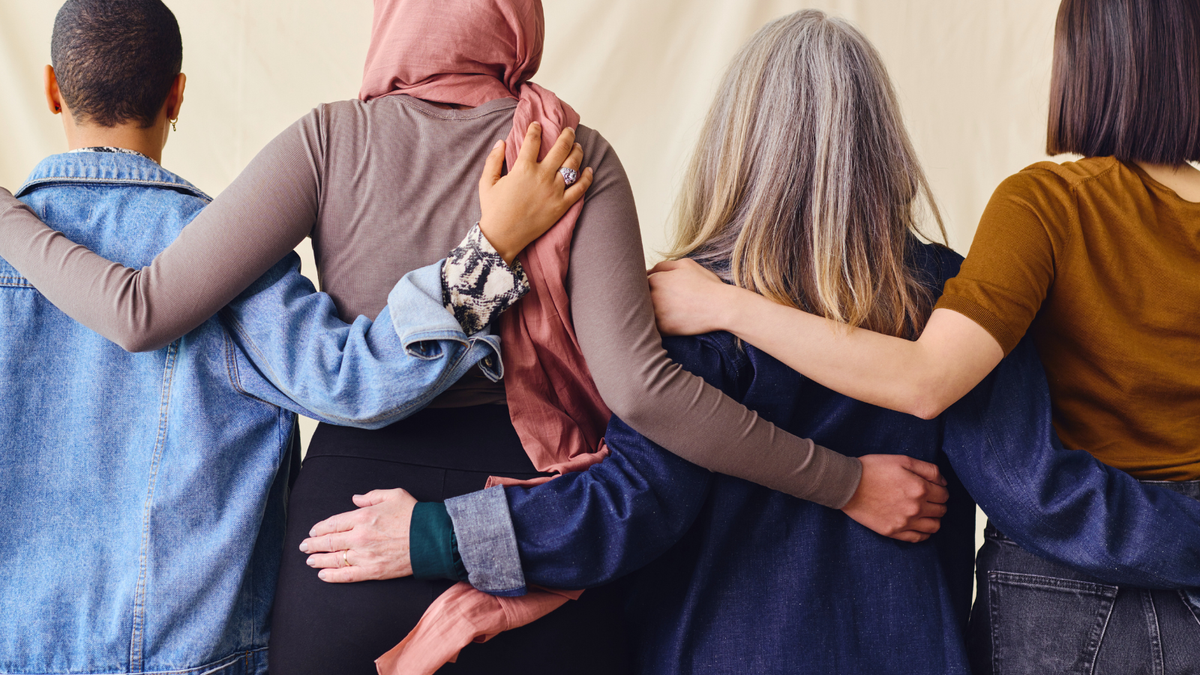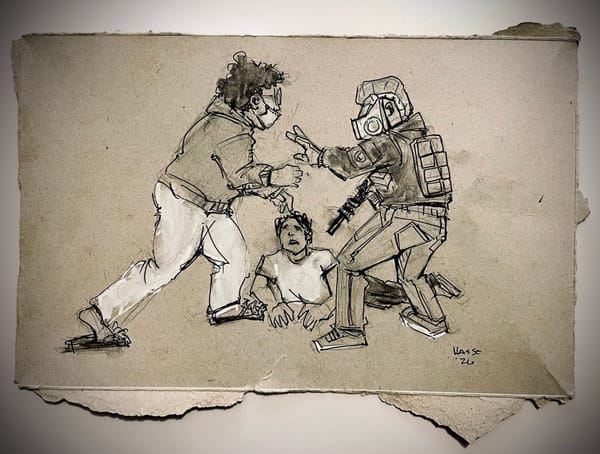We Have to Move
"There are living, breathing people all around you who need your sense of decency to be made material. Don’t give up on them, or on you."


There’s a refrain I’ve been trying to get out of my head this week. It’s a taunting bit of language that has the potential to devastate and demobilize. The words “too late” chase my thoughts—about fascism, climate collapse, or altering our disastrous course at all. Sometimes, they sound like a cynical heckler, passing judgment on my best efforts, and sometimes, they sound like a familiar, frightened child. Regardless of tone, I understand where the sentiment is coming from.
This week in Chicago, ICE agents lobbed a tear gas canister at protesters in a residential neighborhood. Again. That same afternoon, Donald Trump responded to a question about whether he was declaring war on drug smugglers—a reference to his unauthorized bombing campaign targeting boats in the Caribbean and Eastern Pacific—by saying, “We're just gonna kill people.”
ICE has become a militarized fighting force, and while the courts quibble over whether Trump can deploy the National Guard at will, federal agents hunt our neighbors in the streets, gas us, shoot us with pepper balls, and disappear people.
As climate chaos deepens, our government is doubling down on policies that will amplify the devastation.
While some liberals marvel at the destruction of the East Wing of the White House, I am worried about what happens when the ongoing federal shutdown disrupts SNAP benefits. I am stressed about hospital closures that seem inevitable in the wake of Trump’s Medicaid cuts, and about the families of my kidnapped neighbors who can’t make the rent without the lost income of their stolen loved ones. I am worried about people who are acting against these horrors, and what could happen to them under an administration that declares, “We’re just gonna kill people.”
A few days ago, I was out on ICE patrol. I got word that a volunteer was in trouble, and rushed to their last known location. I found their empty car in an alley—windows still rolled down, their car keys between the front seats, Know Your Rights flyers piled in the back. Men called out from a nearby building that they saw ICE agents take the volunteer.
We’re too late, I thought.
I could have screamed.
And those fucking words again.
We’re too late.
Have you been hounded and haunted by those words lately?
For what it’s worth, it’s a sentiment that’s never as true as it feels.
There’s always a next right thing to do.
I, and others, wanted to arrive before that volunteer was taken by ICE. We wanted to make a fuss, get in the way, or at least make some noise, so our co-struggler would know they weren’t alone. But when someone is detained or arrested, there’s still plenty to do. Finding out where they wound up, managing jail support, and making sure other community members are as safe as possible—all of that matters when someone is apprehended by ICE or the police. It also matters that, within a few minutes, there was a small crowd of volunteers in that alley, strategizing about getting the missing volunteer’s car moved to a safe location, documenting what happened, and getting in touch with the right people.
The work doesn’t stop when we fail or when we’re disappointed. There is always a next step, always another challenge, and I know that I cannot allow myself to freeze up, rather than turning the next corner.
I am not saying there’s no time for rest. Sometimes, you have to take a beat and reset your nervous system, rather than remaining activated and on edge at all times. This is a long struggle, and we have to move as sustainably as we can. But we cannot stop pushing forward because things feel irreparably fucked.
There is no moment when all is lost, and the credits roll. There is no cue that we can all throw our hands up now and give up on each other. No matter how upsetting the headline, no matter how frustrating the organizing meeting, no matter how pompous and arrogant that one guy was, no matter how tired we get of this bullshit or of each other—if you’re still here, feeling, thinking, and hoping for a way out of this, if you’re still holding onto your values and each other, it’s not over. If you are still breathing and trying, it’s not over. It’s not too late, because too late is a fake idea. The people around you will always be worth fighting for, as will your community, as will your humanity.
As Rebecca Solnit wrote in Not Too Late: Changing the Climate Story from Despair to Possibility, “It is late. We are deep in an emergency. But it is not too late, because the emergency is not over. The outcome is not decided. We are deciding it now.”
Our story isn’t over—nor is it singular. This moment of crisis contains countless stories of struggle, resistance, and harm that might still be interrupted. Rather than feeling overwhelmed by the vastness of it all, remember: every intervention, every site of contestation, every kindness and act of courage matters.
Do not allow your values to be captured and contained behind a screen in a cycle of inactive reaction. Jailbreak your cynicism and isolation, and escape your devices. Bring your hope, rage, and potential into the world.
If you reduce anyone’s suffering, if you make anyone feel defended, or aware that they’re not alone, if you make space for hope, if you engage in acts of solidarity instead of stewing in the rancor and alienation that’s killing us—that matters, and it will always matter, under any set of discouraging or terrifying circumstances. I don’t have all the answers. I don’t see a clear path out of this mess, but I refuse to be imprisoned by these conditions in my own mind. I will not be locked into a sense of inevitability that perpetuates everything I hate.
If we choose hopelessness, despair will consume us, and instigating change will become increasingly difficult.
Early in the second Trump administration, there was a lot of talk about people feeling “frozen.” That dynamic—people hesitating, shutting down, pulling back—became a serious obstacle to organizing. And in what felt like an ironic echo of that problem, I was diagnosed with frozen shoulder over the summer. It’s a painful condition that makes you want to stop moving, because the wrong motion can unleash a sharp surge of pain that lingers. However, the less you move, the more entrenched the freeze becomes. Moving gets harder and more painful, and your range of motion shrinks further. So you have to go to physical therapy, you have to keep reaching and bending and stretching, even though it won’t immediately change anything, and the wrong move could randomly bring you to your knees with pain. I hate this condition with every fiber of my being. But I have to keep moving this shoulder. To make healing possible, I have to do a lot of things that don’t feel great. I can’t let the joint harden in a state of inactivity.
You see what I’m getting at here: We have to move.
If you can’t see the light at the end of the tunnel, make some light where you are. Bring some kindness, some care, or some protection to the people around you. And remember that it’s okay to narrate your process. Instead of allowing the words “we’re too late” to echo in your head, allow yourself to say out loud, “I’m trying to be brave, and I don’t know what to do next.” Maybe someone around you can extend you a resource, a next step, or an ask. You don’t need to have a blueprint for the revolution. You need a next move. Because it’s not too late to help someone, to be a moral person, or to fight for another future. There are living, breathing people all around you who need your sense of decency to be made material. Don’t give up on them, or on you. Move.
Author's Note: As preorders of our upcoming book, Read This When Things Fall Apart: Letters to Activists in Crisis—which I edited and contributed to—begin to arrive on people's doorsteps, I wrote this piece in the same spirit as that loving bundle of letters. While the book is already on some store shelves, you can still receive the extra letter I wrote for people who preorder through AK Press and Pilsen Community Books, as long as you order by November 4.
Thank you for supporting this book. It was made with care by friends and co-strugglers who want to help people of conscience navigate these times—and I think we all need that right now.
Organizing My Thoughts is a reader-supported newsletter. If you appreciate my work, please consider becoming a free or paid subscriber today. There are no paywalls for the essays, reports, interviews, and excerpts published here. However, I could not do this work without the support of readers like you, so if you are able to contribute financially, I would greatly appreciate your help.




